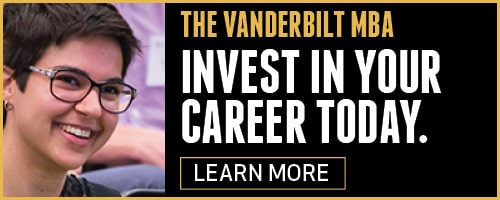By Nathaniel Luce
In the course of their job searches, MBAs will likely come across Leadership Development Program (LDP) opportunities at a variety of companies. LDPs are designed to identify and train the next generation of corporate leadership. They come in many flavors and do not resemble traditional MBA roles. We spoke with Amanda Fend in Vanderbilt Business’ Career Management Center to learn more about the structure, intent, and outcomes of LDPs.
What’s the purpose of a Leadership Development Program
Companies use LDPs “to build a company’s leadership pipeline, identify the future leaders of the company early on, and provide them exposure to several areas and levels of the company,” says Fend, “so that ultimately, when they’re out of the program, they’ll move into a leadership role. “
How are they structured

Amanda Fend
To provide that exposure across areas, LDP participants rotate through different roles on a schedule. Rotations can last anywhere from six to 18 months, and the number of rotations can vary as well. An LDP may also involve moving to different cities, depending on the company’s structure.
All in all, employees could spend anywhere between 18 months and seven years in a company’s Leadership Development Program. “There’s a wide spectrum of programs across all industries,” Fend says.
LDP programs that focus on general management will put employees in a wide variety of roles at all levels. “I know some LDPs will send MBAs into the field to manage call centers, or a retail location, or several retail locations,” Fend explains. Every role may not be on an MBA’s wish list, but they will get a “360-degree view, from the customer level to the CEO, who they’re probably having lunch with once a year,” she adds.
Other LDP programs focus exclusively on a function, such as finance or operations, rotating employees through different positions within a department. “When it’s more specialized, participants will probably know the specific type of role they want after the program,” Fend says.
What happens after the program ends
“That’s what MBAs want to know first and foremost,” Fend says. Some LDPs have very specific outcomes, where employees end up in a director-level position. Others may be more ambiguous, assigning participants to a role based on fit, the company’s needs, or a combination of both. It’s imperative for MBAs to develop a firm understanding of a program’s structure and outcomes through the recruiting process.
What is an LDP internship
 Some MBA recruiters post LDP internships (general management or function-specific) that often serve as gateways into a full-time LDP program. “Like with many other internships, companies are trying to mine candidates and yield them for full-time positions, and the internship is their recruiting tool,” Fend says.
Some MBA recruiters post LDP internships (general management or function-specific) that often serve as gateways into a full-time LDP program. “Like with many other internships, companies are trying to mine candidates and yield them for full-time positions, and the internship is their recruiting tool,” Fend says.
The internship probably won’t provide an experience akin to a full-time LDP — there simply isn’t enough time — but it will likely offer lots of exposure to the company’s culture, people, and locale, along with an interesting MBA-level project that may have a business impact. “They’re using the summer for students to try out the company and industry, and decide if it’s where they want to commit,” Fend says. “On the other side, the company is about to invest a lot of time and resources into you, that they want to make sure that it’s the right fit.”
It’s a familiar blueprint for traditional MBA internships — “all internships are interviews,” Fend says — but the full-time LDP offers extended at the end of the summer represent a very serious commitment of time and resources from the employer and employee, so it’s incumbent on MBA candidates to seriously evaluate their LDP internship experiences before accepting an offer.
Who does well in LDPs, and who doesn’t
There are features of LDP programs that may dissuade MBAs from considering them. Leadership Development Programs can require a flexibility of location that MBAs with partners and/or children may not have. They also require a sufficient amount of interest in an industry or function to stay the course for the duration of the program.
MBAs with a few years of work experience or more tend to do well; in fact, many LDPs require 3 or 5 years’ worth. “In your first rotation, you’re very likely managing teams or people. Some people might be older than you or have more experience, so you’ll need some credibility,” Fend explains. “Companies are looking for strong business backgrounds or strong leadership skills.”
Fend is quick to point out that strong leadership skills can be developed in niche settings. “A lot of companies are open to people with different backgrounds,” she says. MBA candidates with a track record of working cross-functionally, solving problems, identifying and resolving issues, leading teams, and managing people can be excellent fits for a Leadership Development Program.
The underlying premise for LDPs is the same for employers as it is for students: “If you’re doing an LDP, you want to do it right,” Fend says. For an employer, that means providing the structure and resources it believes will yield long-lasting, effective leaders in its organization. For MBAs, it means developing a thorough understanding of their interests, the programs available, and where to find the right fits.
Want to learn more about getting an MBA at Vanderbilt Business? Visit the program page or request more information.
